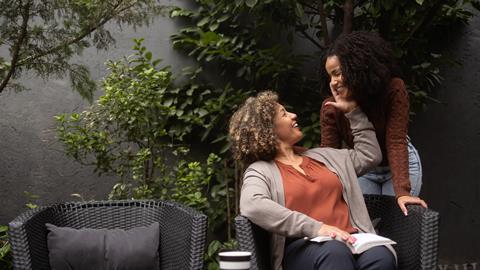Cathy Madavan tackles this parenting paradox with helpful advice she’s learned through raising her two grown-up daughters
There are upsides to empty nesting. Okay, so I may stalk my daughters on find-my-friends and will drop everything (literally) to answer a call no matter how inconvenient the moment, but we no longer have to pay for their dentistry or mobile phone bills, so that’s a win. More seriously, my mind is boggled as I look at how my two angelic(ish) little girls have morphed into strong independent women in their 20s. But even at this stage, it’s a tension to manage this parenting lark. We don’t want to be absent or distant, but neither do we want to be overbearing or controlling. We don’t want to abdicate responsibility but neither do we want to foster an unhealthy dependence.
Helping to nurture our daughters’ confidence and independence, even in the early years, means managing that parenting paradox as well as possible. I’m aware that for parents with children with additional or complex needs, expectations and goals might be very different, but the challenge remains, even as it adapts to our unique circumstances.
Know your parenting style
Most of us have heard of helicopter parents, and we’ve probably witnessed them too (not us, obviously). These are the parents who hover endlessly over their children, inserting themselves into every situation and conversation. Helicopter mums have all the answers, volunteer at absolutely everything and rather like being in control. Now, it’s good to be attentive, and some kids need more support than others, but girls who feel dominated and disempowered are likely to learn to simply give way to others. Other parents are less helicopter and more rhino, eventually charging in, blowing a gasket and causing destruction along the way. Again, it is good to be protective, but hey, not every situation needs an SAS-style rescue plan. Or perhaps you’re more of an ostrich who would genuinely prefer to bury your head in the sand over the issues of the day. If you don’t know, you don’t have to confront, right?! Of course, allowing freedom is excellent, but abandoning our girls in a decidedly unsafe world is not wise. Maybe you relate to one or none of these, or maybe it depends on the day, but your personality has its parenting strengths and weaknesses and if you don’t know what these are, ask your daughter. She’ll undoubtedly have some insight to share…
Practise decision-making
I like to reminisce about the days when the girls were small and I got to choose their clothes, I could understand their homework and they believed I had all the answers to all life’s questions (unless their dad was around, because clearly, he knew best. I’m not bitter.). When children are small, you generally make the decisions unless you want to spend an entire day negotiating over craft activities. But as tempting as unilateral decision-making may be, even young children can be given the simple choice of two things – option A or option B. Learning to step out and make decisions and then living with that choice (without you always overruling) builds confidence in young minds. Girls who may instinctively defer to siblings or friends will benefit from opportunities to have a stake in the game for themselves. And as they grow older, and we increasingly move from controlling to coaching, we might ask more questions to enable them to think for themselves. While choices need to be sensible and do-able (no love, you can’t tattoo your first boyfriend’s name on your arm) having agency in choices about after-school activities or room décor, for example, will help a young woman to find her own voice and to know her own mind.
Find a compelling cause
Nothing builds confidence more than knowing the world is bigger than you, but you can still make a difference in it. Psychologists talk about the importance of ‘mastery’ or developing skills, hobbies or challenges where we can excel or at least find enjoyment. We grow confident when we feel competent, after all. And if you can channel those skills towards helping others, then all the better. Any opportunity to fundraise, volunteer or contribute to a compelling cause that they care about will build motivation and satisfaction. Whether they can bake, cycle, work with little kids or clean cars, it’s all worth encouraging. We even managed to take our girls on a mission trip to broaden their perspective further. Being perfectly honest, my main strategy for surviving the teenage years (apart from prayer) was to keep the girls busy doing things they enjoyed and excelled at. Encouraging their passions and getting stuck into musical ensembles, youth work and community groups was far more fulfilling than being endlessly caught up in online drama or hanging out in the park. Yes, I felt like a chauffeur, but they built great relationships, made brilliant memories and realised that God had given them abilities and passions that could make the world a better place.
Develop strategic thinking
As children get older, we can help them to plan ahead and to grow in independence. To be clear, the teenage brain is not fully developed in this regard, and our expectations should be realistic. However, if we hope to raise confident daughters who feel they can solve problems and will back themselves, it has to start somewhere. When our children face challenges or choices, it can be helpful to discuss strategies, and to plan with them if they are willing. In practical areas like handling money, even younger children can budget simply – with pots for spending, saving and giving. We did this, and it never ceases to amuse me now, watching our daughters teach their boyfriends how to create budgeting spreadsheets!
Having agency will help a young woman to find her own voice and to know her own mind
Inevitably young people will make impulsive decisions that make us wonder whether they’ve ejected their brains. But confidence comes from making mistakes and learning from them too, as hard as that is to observe as a mum – especially if you have helicopter tendencies! Our children are not perfect, and neither are we. But we can purposefully nurture independence in the hope that eventually they will confidently fly free.


































No comments yet